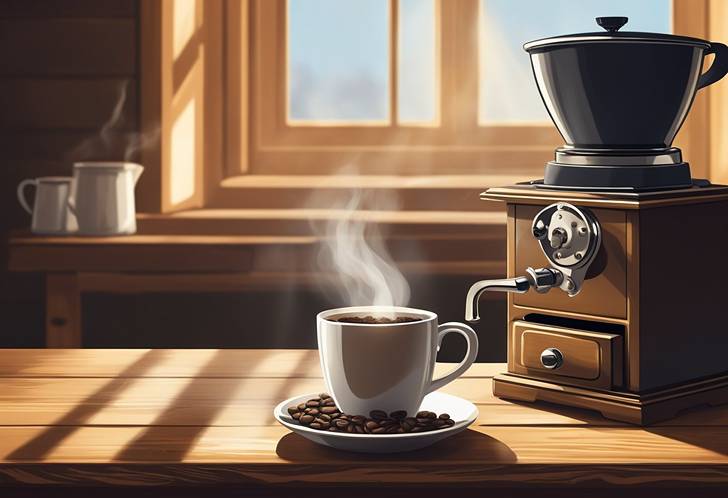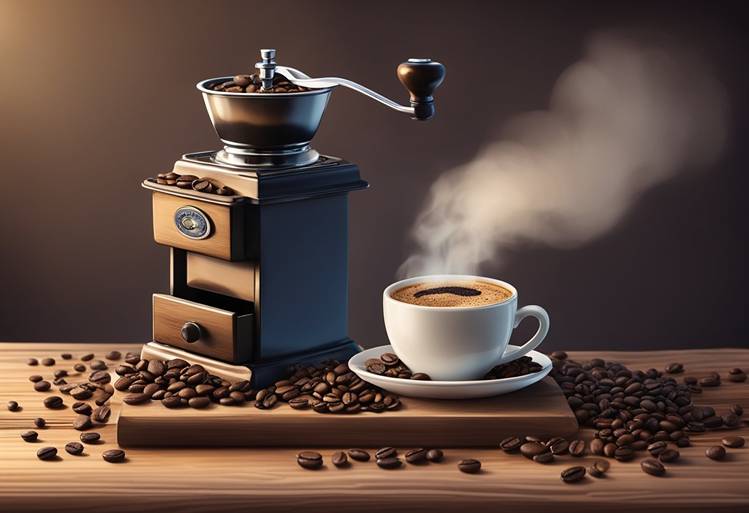Unfiltered coffee is a type of coffee that has not been filtered during the brewing process, leading to a unique texture, flavor, and appearance compared to your regular cup of joe.
Methods like the French press, percolator, and Moka pot are popular for brewing unfiltered coffee, as they allow the coffee grounds to remain in contact with the water for an extended period.
This results in a stronger and more robust drink taste, as well as increased caffeine content. However, there’s more to unfiltered coffee than just its distinctive flavor profile.
The lack of filtration also means that various compounds remain in the final brew, which can have both positive and negative effects on your health.
While some studies have suggested that unfiltered coffee may contain more antioxidants, it also has higher levels of cholesterol-raising compounds.
Therefore, it’s essential to understand the potential risks and benefits associated with this unique brewing method to make informed decisions about your coffee consumption.
Key Takeaways
- Unfiltered coffee features a distinct flavor profile due to the lack of filtration during brewing.
- It can contain higher levels of antioxidants, but also cholesterol-raising compounds.
- Brewing methods like French press, percolator, and Moka pot are commonly used for unfiltered coffee.
What is Unfiltered Coffee?

Defining Unfiltered Coffee
Unfiltered coffee refers to coffee that has not been run through a filter during the brewing process.
As a result, the grounds remain in the coffee when it is served, which can impact its taste and texture.
Compared to filtered coffee, unfiltered coffee typically contains higher levels of compounds such as diterpenes, which can make higher cholesterol.
Contrasting Filtered and Unfiltered Coffee
While filtered coffee is made by passing water through coffee grounds and a filter, which removes most of the grounds and oils, resulting in smoother, cleaner coffee, unfiltered coffee allows the grounds to remain in contact with the water, often leading to a bolder, stronger flavor.
However, unfiltered coffee can sometimes contain fine particles, which could affect its taste and consistency.
Popular Unfiltered Brewing Methods
Several popular brewing methods result in unfiltered coffee:
- French press: A brewing method where coffee grounds are steeped with hot water and then separated using a plunging mechanism. This method allows the coffee’s natural oils and fine grounds to remain in the final product.
- Turkish coffee: A traditional method where ultra-fine coffee grounds are combined with cold water, then heated and brought to a boil. The resulting coffee is thick, rich, and contains grounds suspended in the liquid.
- Moka pot: A stovetop coffee maker that uses steam pressure to push hot water through coffee grounds, resulting in strong, flavorful coffee. While a metal filter may be used, it does not remove all the oils and fine grounds, classifying Moka pot coffee as unfiltered.
Bear in mind that each unfiltered brewing method imparts its own unique flavor and finish to the coffee, creating distinct experiences for your taste buds.
Components and Flavors

Coffee Oils and Their Impact on Flavor
Unfiltered coffee allows the coffee oils to pass through the brewing process, giving a more bold flavor and texture to the final cup.
As mentioned in this article, these oils play a significant role in shaping the flavor and mouthfeel of unfiltered coffee.
The oils present in the coffee beans carry unique taste notes, such as chocolate, nuts, and spices.
By avoiding the use of filters, these oils blend seamlessly with the water, creating a richer and more authentic aroma.
Contrary to filtered coffee, you can expect an enhanced sensory experience in regards to flavor profile and mouthfeel when you enjoy unfiltered coffee.
The Role of Sediments in Brewing
Another key component that affects the taste and quality of unfiltered coffee is the presence of sediments.
Unfiltered coffee methods might leave fine coffee grounds in your beverage which contribute to the unique characteristics of unfiltered brews.
These fine sediments not only impact the texture of the coffee, but also enhance the overall flavor. For example, they can provide a more intense and satisfying bitterness that appeals to coffee enthusiasts who crave a strong and robust drink.
Additionally, the sediments give unfiltered coffee its distinctively thick and rich mouthfeel, making it a popular choice for those who appreciate the full-bodied taste of coffee.
Keep in mind, however, that the potential health implications such as increased cholesterol levels should be taken into account when consuming unfiltered coffee.
Nonetheless, if you are looking for a lively and unique sensory experience, unfiltered coffee might be worth a try.
Enjoy the harmonious fusion of intense flavors, rich oils, and textural sediments that unfiltered coffee has to offer.
Health and Unfiltered Coffee

Cholesterol Concerns and Unfiltered Coffee
Unfiltered coffee contains certain compounds, such as diterpenes, which can raise cholesterol levels. In particular, two diterpenes – kahweol and cafestol – are known to increase LDL cholesterol.
A cup of unfiltered coffee has 30 times more diterpenes than filtered coffee.
This means that your LDL cholesterol levels might be affected if you frequently consume unfiltered coffee, like French press or Turkish coffee.
It is essential to monitor your caffeine intake and consider using a coffee filter if you already have high cholesterol or are at risk for heart health issues.
Limiting unfiltered coffee consumption and opting for filtered coffee can help you control your cholesterol levels and maintain your heart health.
Potential Health Benefits and Risks
Despite the cholesterol concerns surrounding unfiltered coffee, it also offers potential health benefits.
For instance, it is a rich source of antioxidants that can protect your cells from oxidative stress and inflammation.
Unfiltered coffee has also been associated with certain protective effects against type 2 diabetes and some types of cancer, as it contains bioactive compounds with anti-inflammatory properties.
However, it’s important to notice that these potential benefits need to be balanced with potential risks, such as increased cholesterol levels and blood pressure.
When deciding on your coffee consumption, remember to consider the following factors:
- Caffeine intake: Limit your daily caffeine intake to avoid potential side effects like increased heart rate and high blood pressure.
- Antioxidant content: Choose coffee sources rich in antioxidants to maintain cellular health and reduce inflammation.
- Cholesterol levels: Monitor your cholesterol levels closely and opt for filtered coffee if you have high cholesterol or are at risk for heart disease.
As you enjoy your morning cup of coffee, keep these health considerations in mind and choose the brewing method that best suits your individual health needs and preferences.
The Coffee Experience

Caffeine Content and Perception
When it comes to unfiltered coffee, the caffeine content can be higher than in filtered coffee, mainly due to the absence of a paper filter which might absorb some of the caffeine.
This might result in a stronger and more potent cup of coffee that can give you an energizing boost.
As a coffee lover, you might find this appealing and enjoy the robust flavors that unfiltered coffee has to offer.
However, it is important to note that unfiltered coffee also contains more diterpenes, compounds known to raise cholesterol levels, which might have a negative impact on your health.
As you consume unfiltered coffee, keep the potential health implications in mind and consider adjusting your intake accordingly.
The Impact of the Brewing Process on Taste
The brewing process has a significant impact on the taste of unfiltered coffee.
Various coffee brewing methods can be employed to create the complex flavors you desire:
French Press: This method involves steeping coffee grounds in hot water followed by pressing them through machine with a metal filter to retain the oils and flavor compounds.
Turkish Coffee: A unique technique that requires finely ground coffee, hot water, and optionally sugar, mixed together and boiled to create a dense, frothy drink.
Cowboy Coffee: Traditionally brewed over an open fire by mixing coffee grounds with hot water and letting it steep, followed by straining out the grounds.
Each of these brewing methods contributes to the taste and aroma of your cup of unfiltered coffee differently.
For example, French press coffee utilizes a metal filter, which retains more oils and flavor compounds compared to a paper filter.
These oils enhance the overall taste, making it a richer and more authentic experience.
As you continue to explore the world of coffee, experimenting with a variety of brewing methods and paying close attention to the impact they have on taste will be the key to achieving the perfect unfiltered coffee experience.
Preparation and Equipment
Essential Tools for Unfiltered Coffee Preparation
When preparing unfiltered coffee, you’ll need some essential tools to ensure a flavorful and authentic coffee experience.
First, invest in a high-quality coffee kettle specifically designed for precise water pouring.
This will allow you to have better control over the water flow and distribution when using pour-over methods.
Selecting the right coffee grinder is crucial. Make sure to choose one that provides consistent and evenly ground coffee beans.
This will enhance the coffee’s flavor and quality, especially when using methods like the French press or Turkish coffee.
A proper coffee scale is helpful for measuring the precise amount of coffee and water needed for your preferred brewing method.
This ensures a consistent brew every time.
It’s also essential to have a reliable coffee thermometer to track the water temperature throughout the brewing process, as precise temperature control is vital for extracting the best flavors.
Comparison of Unfiltered Coffee Devices
There are several unfiltered coffee devices that offer unique brewing experiences. Here’s a brief comparison:
French Press: Also known as a press pot or plunger pot, this device consists of a cylindrical glass or stainless-steel container, a plunger, and a metal or nylon mesh filter. Simply add coffee grounds and hot water, let it steep, and then plunge to separate the grounds from the liquid, resulting in a bold and intense flavor profile.
Turkish Coffee Pot: Also called a cezve or ibrik, this small pot is used to prepare Turkish coffee, which is finely ground coffee mixed with water, and often sugar, and brewed over low heat. The result is a strong, thick coffee with grounds settling at the bottom of the cup.
Pour-Over Devices: There’s a variety of pour-over devices, such as the Chemex, Hario V60, or Kalita Wave. These devices usually require a paper filter but can also be used without one for unfiltered brewing. With a gooseneck kettle, you carefully pour hot water over the coffee grounds, allowing the water to flow through the coffee and into a vessel below.
AeroPress: This compact, portable brewing device uses a combination of immersion and pressure to create a smooth, full-bodied coffee. However, it usually requires a paper or metal filter, but you can experiment with unfiltered brewing by skipping the filter altogether or trying a reusable metal filter.
Percolator: A classic coffee maker that continuously cycles boiling water through coffee grounds, extracting a robust flavor. Traditional percolators often have a stainless-steel filter basket and can produce unfiltered coffee if desired, just be cautious of potential over-extraction and bitterness.
In conclusion, the choice of unfiltered coffee brewing equipment depends on your personal taste preferences and desired brewing method.
By selecting the right tools and devices, you can enjoy an authentic and delicious cup of unfiltered coffee.
| Aspect | Description |
|---|---|
| Definition | Coffee that hasn’t been filtered to remove grounds or sediment, often resulting in a richer, stronger brew. |
| Brewing Methods | French press, Turkish coffee, cowboy coffee, espresso (to some extent), and traditional Ethiopian coffee are common methods for making unfiltered coffee. |
| Taste | Unfiltered coffee tends to have a fuller body and richer flavor profile due to the presence of oils and fine particles in the brew. It can be more intense and bold compared to filtered coffee. |
| Texture | Often thicker and grittier due to the presence of coffee grounds or sediment. |
| Health Implications | Some studies suggest that unfiltered coffee may contain higher levels of cafestol, a compound that can raise LDL cholesterol levels. However, the impact on health is still debated, and many enjoy unfiltered coffee without adverse effects. |
| Brewing Time | Typically requires a longer brewing time compared to filtered coffee to allow flavors to fully extract. |
| Equipment | Specialized equipment like French presses or Turkish coffee pots is often used for brewing unfiltered coffee. |
| Cultural Significance | Unfiltered coffee is deeply ingrained in the coffee cultures of various regions, such as Turkey, Ethiopia, and parts of Europe. It’s often associated with traditional brewing methods and rituals. |
Conclusion
Unfiltered coffee, often known as boiled coffee or plunge coffee, is a brewing method where coffee grounds come into direct contact with hot water without the use of a paper filter.
This method includes styles like coffee made with a French press, espresso, Turkish, and Scandinavian traditional brews.
Unlike drip coffee makers or instant coffee preparations, unfiltered coffee retains coffee oils and sediments that could influence both the taste and nutritional aspects of the final cup.
A significant difference between filtered and unfiltered coffee lies in its impact on health, particularly concerning cholesterol levels.
Studies have shown that unfiltered coffee raise cholesterol due to substances called diterpenes, mainly cafestol and kahweol, present in the oils of coffee beans.
These compounds have been linked to a spike in LDL cholesterol levels, which is a factor to consider for coffee drinkers with existing risk factors for cardiovascular diseases.
Despite concerns over cholesterol, the overall nutrition profile of unfiltered coffee suggests it can be part of a healthy lifestyle when consumed in moderation.
The association between coffee consumption and mortality risk factors, including coronary diseases, appears to be largely positive, indicating that the benefits of drinking coffee may outweigh the potential risks for most individuals.
However, for those concerned about the effects of unfiltered coffee on cholesterol, options like switching to instant or filtered coffee, which lower the presence of diterpenes, may be advisable.
It’s also worth noting that the consistency of coffee consumption and individual health conditions vary, so what may be harmful to one person isn’t necessarily a risk for another.
In conclusion, unfiltered coffee offers a rich, full-bodied experience distinct from instant or drip coffee due to its preparation method.
While it has its nutritional benefits, individuals with specific health concerns, particularly related to cholesterol, should be mindful of their consumption.
For many, the occasional cup of unfiltered coffee is a delightful indulgence that fits well within a balanced diet, contributing to the enjoyment of coffee’s complex flavors without significant health risks.
Frequently Asked Questions

How does the preparation of unfiltered coffee differ from filtered coffee?
Unfiltered coffee is prepared without using a paper filter, allowing the coffee grounds to remain in the final brew.
This contrasts with filtered coffee, where a paper or reusable filter is used to remove the coffee grounds.
Some examples of unfiltered coffee methods are French press, espresso shot, and Turkish coffee.
What potential health effects are associated with drinking unfiltered coffee?
Drinking unfiltered coffee may increase your risk for heart disease due to the presence of diterpenes, which can raise LDL cholesterol levels.
However, it’s essential to consider individual factors and consume unfiltered coffee in moderation.
Can the consumption of unfiltered coffee have any particular benefits?
Unfiltered coffee contains more caffeine compared to filtered coffee, which may provide a stronger energy boost.
Moreover, unfiltered methods often produce a richer taste profile, allowing you to experience a fuller flavor and aroma in your coffee.
How does espresso compare to other unfiltered coffee methods?
Espresso is a type of unfiltered coffee prepared using high-pressure and finely ground coffee beans.
It often has a stronger, more intense flavor compared to other unfiltered methods, such as French press or Turkish coffee, since it extracts more flavor components from the coffee grounds.
What are the characteristics that define unfiltered coffee?
Unfiltered coffee is defined by its brewing method, which does not involve using paper filters.
This results in coffee grounds remaining in the brew, as seen in methods like French press, espresso, and Turkish coffee.
Unfiltered coffee often has a fuller, more intense taste profile and, in some cases, a higher caffeine content.
In what ways can unfiltered coffee be incorporated into a healthy lifestyle?
To incorporate unfiltered coffee into a healthy lifestyle, consume it in moderation and within daily caffeine intake recommendations.
Pair your unfiltered coffee with a balanced and nutrient-rich diet, regular exercise, and adequate sleep to maintain overall well-being.
If you’re concerned about potential health effects, consult your healthcare provider for personalized advice.
Coffee doesn’t have to concern you.


